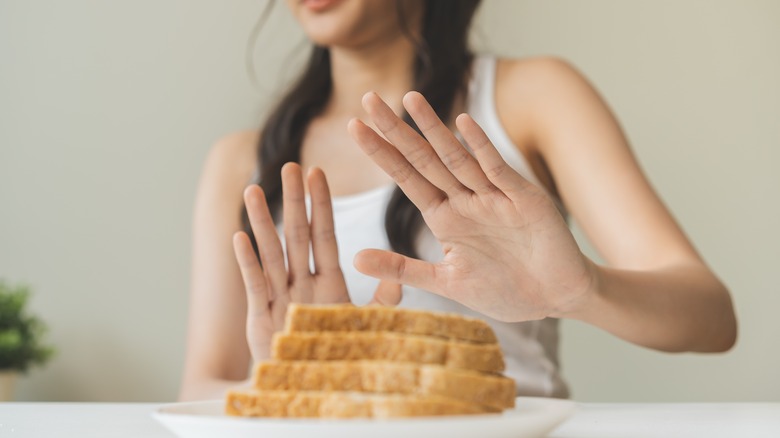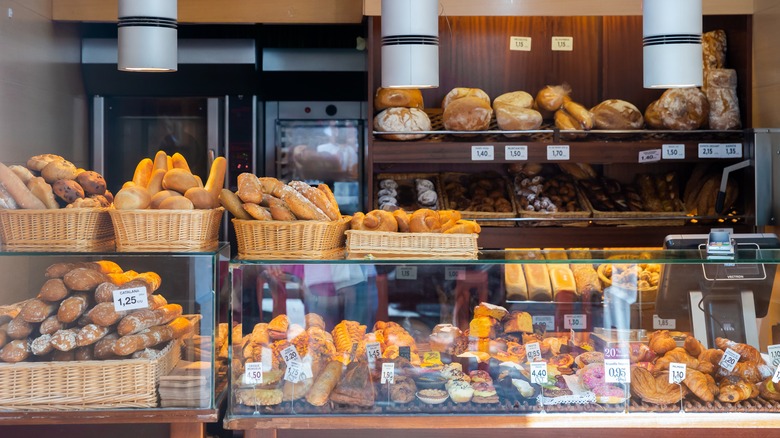Why You Should Avoid Buying Pre-Sliced Bread
We may receive a commission on purchases made from links.
You know how the saying goes, "This is the best thing since sliced bread!" Well, as it turns out, sliced bread may not be the bee's knees after all. The first commercially sliced loaves were produced in Missouri in 1928, and ever since, they've been a staple in every grocery store in America. Unfortunately, slicing bread does more harm than good, and you're better off buying fresh bread from either a professional baker or your local grocery store's bakery.
You see, the trouble with sliced bread is the crust. The crust is essential for keeping loaves moist and flavorful. However, when the crust is sliced apart, the bread dries out quickly and loses its flavor. To get around this, many commercially sliced breads use additives and preservatives to keep bread fresh. Another contributing factor is the use of refined flour, which uses processed grain that has the germ and bran removed, leaving the endosperm. While this produces a lighter texture with a longer shelf-life, it also removes some, if not all, vitamins, minerals, and fiber. To make bread a bit more nutritious, manufacturers can use enriched flour, which is refined flour with supplements such as B vitamins and folic acid added. Sadly, these supplements aren't as good as the real deal, as the human body absorbs nutrients from natural sources better than processed ones.
Circling back to preservatives, there can be many different types of preservatives and additives in processed sliced bread, including potassium bromate, a potentially cancer-causing ingredient already banned for us in bread in several countries, including the U.K. and Canada, though it is still legal in the United States. Other preservatives can include synthetic antioxidants, such as butylated hydroxyanisole, butylated hydroxytoluene, and calcium propionate, used to prevent mold growth.
Why you should buy breads from bakeries (or bake it yourself)
Two of the biggest reasons to consider buying artisanal bread over commercially sliced bread are variety and nutrition. The bread you find in bakeries is often more nutritional, as it won't be made with enriched or refined flour to extend its shelf life. While this means it won't last as long, extra bread can always be frozen to preserve it for longer. Moreover, because it has no preservatives or additives to extend its life, you'll know exactly what you're getting without worrying about chemicals like potassium bromate.
More excitingly, bakeries tend to have a much wider variety of bread to choose from, such as buttery and soft focaccia, chewy and rustic ciabatta, sweet brioche, airy challah, and the always popular sourdough. Of course, many will also have whole grain, rye, pumpernickel, potato, and baguettes. However, sometimes grocery stores with in-house bakeries will offer similar bread that's baked fresh, so if you don't have a dedicated bakery in your town, don't check your local supermarket!
Alternatively, you can bake your own bread, which can even save you some money. Homemade bread saw a huge uptick during the pandemic, particularly regarding sourdough, and it's something many folks have continued. Baking your own bread is easier than it seems, especially if you have something like Cuisinart's Break Maker Machine or Elite Gourmet's Programmable Bread Maker. Plus, nothing beats the smell of freshly baked bread. So long as it's stored correctly once baked, making bread yourself gives you complete control over the ingredients you use, and it's a remarkably fulfilling (and delicious) hobby!

